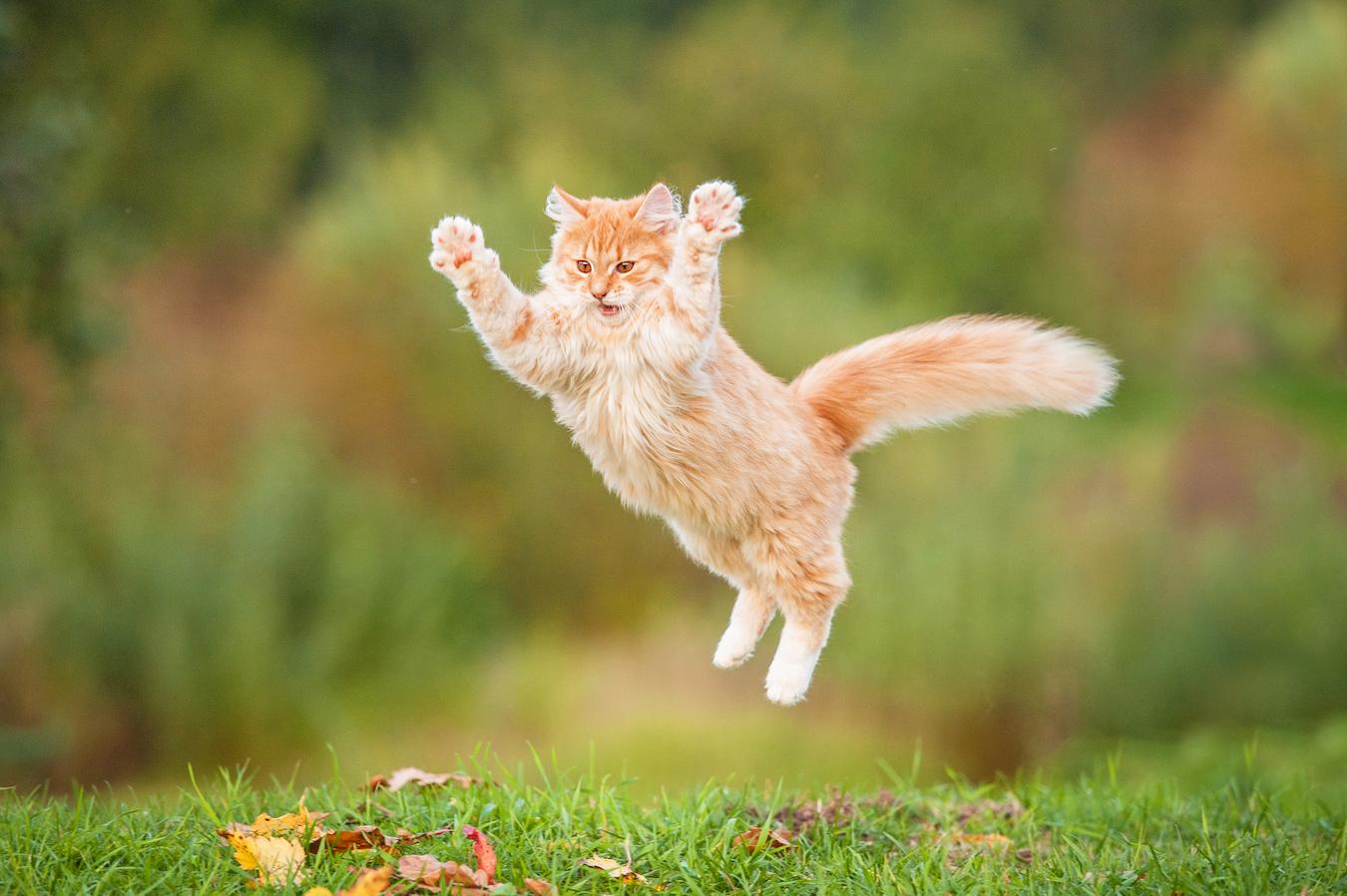If you've ever been kept awake by the sound of your cat crashing through the house, we feel your pain. But did you know this could be a sign of stress?
We’ll cover other unusual signs your cat might be stressed out and walk you through five steps you can take to calm them down.
Key Takeaways
- Stress in cats can manifest in certain subtle behaviors that you might not recognize, like excessive grooming, staring, or eating less.
- Cats can become stressed from many things, including unfamiliar people and places, being left alone, loud noises, and other animals.
- Stress can also be positive. Your cat might have too much energy or be overexcited.
- We cover five steps to calming your cat down: removing the thing causing the stress, being patient, creating a safe space, working off excess energy, and using calming treats or supplements.
See Related: When Is a Dog Considered a “Senior”?
Signs Your Cat Is Stressed
You might think you know the signs of stress. But think again.
Like with humans, cats can act in strange ways when stressed. They don't always present the obvious signs you might expect. Sometimes, stress can manifest in ways you might not even notice at all.
Additionally, your cat is an individual, just like you. They might have their own quirks and behaviors, which other cats wouldn't do. You might not even know that a certain thing your cat does is actually because of stress!¹
Fortunately, your close bond with your cat should help you learn to recognize their subtle signals with just a little work.
Of course, some cats make it very clear when they're stressed.
Many of us pet parents have woken up in the middle of the night to our cat getting up to mischief. Or watched as our furry friend overreacted to something mundane. The viral trend of cats jumping when they see a cucumber is just one example.
At times, it might seem like you've got an overly energetic toddler in your house. No matter what you do, you just can't seem to calm that cat down!
We know the feeling. That's why we've compiled this research-backed, five-step process for making a cat calm.
First, though, let's cover some of the signs your cat might be stressed out.

Repetitive Actions
Your cat's body language is one of the main ways it communicates with you. Pay close attention to your cat's behavior.
If your furry friend is repeating actions an unusual amount, they might be stressed.
Grooming is a great example. It's entirely normal for cats to keep themselves clean. In fact, grooming is often a sign of a healthy, happy cat.²
Excessive grooming, though, is a classic sign of cat stress. Your feline friend could be grooming to try to keep themselves calm.³
Pacing is another repetitive behavior that's often a sign of stress. So is staring.
Keep an eye out for normal behaviors that are repeated more than usual. That might help you identify when your cat isn't feeling so calm.
Physical Changes
Stress affects our bodies in many ways. When we feel stressed, our bodies release stress hormones like cortisol. These hormones trigger a number of reactions, some of which are visible to others.
The same is true with cats. Look out for the following:
- Breathing faster
- Dilated pupils
- Salivating
- Holding ears back
- Puffing up tail
- Tail twitching
- Tail being held close to the body
- Hair standing on end
- Shivering or trembling
- Freezing
- Crouching
- Leaning away from something
- Fleeing
All of these can be physiological signs of stress.
Acting Different
No one knows your cat better than you do. In turn, you're best placed to recognize when your cat is acting differently.
By this, we don't mean the physiological reactions described above. We mean things that could be totally normal.
For example, some cats are naturally more affectionate than others. And while some cats are naturally bold and curious, others might prefer to keep to themselves.
What you need to look out for is change.
Is your cat avoiding you more than they normally do? Are they always hiding? Have you caught them staring at something for unusually long periods of time?
All of these changes can indicate that your cat is feeling on edge.
Bonus: How to Give Your Dog CBD Oil

Appetite Changes
Most cats are creatures of habit. You likely know whether your cat is particularly food motivated. And you've likely got a store of their favorite treats, if they're a cat with a penchant for snacks.
Therefore, you should be able to notice if something changes. Perhaps your cat isn't eating as much as they used to. Or a treat that normally has them running and begging leaves them totally uninterested.
These changes in appetite can be a sign that your cat is stressed. ³ ⁴
Why Your Cat Might Be Stressed
It's one thing to recognize that your cat is stressed. The next step is calming them down.
However, in order to be able to calm your cat down, you need to know why they might be stressed in the first place.
All kinds of things can stress cats out. These things might not be worth stressing over. Sometimes, cats can feel threatened when there's really nothing there at all.
That doesn't matter. The stress response is caused by the perception of a threat, not the actual existence of one.
Let's explore some of the more common examples of cat stressors.
Unfamiliar People Or Places
Despite their reputation for curiosity, many cats actually prefer the familiar.⁴
Therefore, new people can stress them out. Perhaps you've invited some friends over. Or maybe family is visiting.
A new baby often creates stress for cats.
New environments are also stressful for our feline friends.
Being Left Alone
Cats might not love new people, but many equally dislike no people at all.
Remember, your cat loves you. You may well be their entire life!
When you leave, they might not understand why or where you've gone. They could think you've left forever.
As you can understand, that can make them afraid.⁶ One study from 2020 found that cats that disliked being separated from their owners often complained loudly. Some took their feelings out on the house itself, becoming destructive.⁵
Loud Noises
All kinds of loud noises can freak a cat out. A car horn. The doorbell. Shouting. As the Fourth of July approaches, keep in mind that fireworks are also known to cause stress in pets.
That's not hard to understand. After all, it's difficult to relax when strange loud noises keep interrupting your cat nap!
Other Animals
We all love the videos of cats making friends with other animals. But for many cats, other animals are most definitely not friends. At least, not at first.
Dogs, other cats, kittens, horses... the list goes on. These animals might smell strange, act strange, and otherwise unnerve your cat.
Car Rides
Cats who join their owners in the car for road trips, camping, or van life are another source of viral internet videos. But they are actually the exception, not the rule.
In general, cats (and dogs!) dislike cars. Again, it's not hard to understand why. Your cat doesn't know what this large, loud, smelly machine is.

Positive Stress
Not all stress is negative. Positive stress can be equally frustrating for the tired pet parent.
Even adult cats, for example, might insist on getting up to mischief during the night. They can keep you up with their antics, leaving you wondering where they get the energy.
Well, first of all, your cat is probably sleeping most of the day. Research shows it's quite normal for cats to sleep up to 17 hours in a single day.⁷
All that shut-eye can leave your cat with some serious energy to burn during the night. Hence, all the nocturnal activity.
Some activity at night is completely normal. After all, cats don't keep to the same strict schedules we do. It's not like staying up late will make your cat miss something the next day.
But if your cat is keeping you up, or making a ruckus, or is totally unable to settle down, they might be stressed out.
Five Steps to Calm Cats Down
Step 1: Remove Stressors
The simplest solution to stress is to remove the thing causing the stress.
Remember, your cat's senses are different from yours. They might be picking up on something you can't.
A particular item, for example, might smell strange to your cat. Or perhaps they dislike the sound of the doorbell.
Whatever it is, if you can remove it, consider doing so.
Step 2: Be Patient
The last thing you want to do is become stressed yourself. Cats can sense when people are stressed, and often become stressed themselves when that happens.⁸
Try to always use a soft, soothing voice when speaking to your stressed cat. If you need to approach them, do so slowly and carefully.
Overall, remember to be patient. Helping a cat get over its stress can take time.

Step 3: Provide a Safe Space
A safe, calm environment is one of the best things to offer a stressed cat.
In general, keep your cat away from unfamiliar animals and people, especially if you think they might not get along with your furry friend.
For example, you could try giving your cat their own space. That might be a room or a distinct part of a room. It could even be the cat carrier or cardboard boxes.
The same principle applies when taking your cat to new places. Try to give them somewhere they can feel safe. A cat carrier is the most common way to do this.
The exact space you offer your cat matters less than being able to make your cat feel calm. White noise or soft music can help create a calming effect.
Some cat owners swear by the calming nature of classical music. ⁹ Maybe your pet is more partial to jazz. One study even found that “cat-specific” music, which was made of cat noises like purring, had a calming effect.¹⁰
You can use whatever music you want, as long as your cat seems to enjoy it!¹¹
Step 4: Let Off Steam
This applies mostly to when your cat has too much positive stress. By helping them release all their energy in healthy ways, you might be able to reduce their activity at night.
Cat toys are great for this. So is a scratching post, which has the additional benefit of saving your furniture from potential claw marks. Another option is a cat tree, which can provide plenty of stimulation.
Having these healthy distractions available can also keep your cat calm and occupied during the night, should they feel the need to blow off some steam.

Step 5: Try a Calming Supplement
When all else fails, a calming supplement can be just the thing for a stressed cat.
Catnip, for example, can help calm your cat down. In one study, almost 100% of tested cats responded passively to catnip.¹² In this case, passively means making less noise and moving less than before.
Another great option is CBD. We offer a variety of hemp-based products (including CBD and CBDa) that can help keep your cats calm and relaxed. CBD oil has a pretty good shelf life, but it does work best with regular dosage.
You could try our full-spectrum CBD Oil, which is mixed with organic MCT oil from coconuts and contains a range of cannabinoids and terpenes that help boost the CBD's effect.
If your cat isn't so keen on oil, consider using our Quick Calm CBD spray.
Of course, you could also grab both our CBD oil and Quick Calm spray in a discounted bundle.
Conclusion
All kinds of things can stress out your cat. Fortunately, there are plenty of techniques to calm them down again.
With the five above steps, you should be able to calm your cat — and, crucially, keep them calm!
Keep Reading: 4 Weird Ways Stress Can Affect Your Dog
Sources
- Behavioral awareness in the feline consultation: Understanding physical and emotional health
- Evaluation of grooming behaviour and apparent digestibility method in cats
- Stress in owned cats: behavioural changes and welfare implications
- Effects of stressors on the behavior and physiology of domestic cats
- Identification of separation-related problems in domestic cats: A questionnaire survey
- The effect of owner presence and scent on stress resilience in cats
- Why do cats sleep so much? The hidden science of feline shuteye, explained
- Owner personality and the wellbeing of their cats share parallels with the parent-child relationship
- Influence of music and its genres on respiratory rate and pupil diameter variations in cats under general anaesthesia
- Cats Are Calmed by Cat-Specific Music
- Evaluation of music therapy to reduce stress in hospitalized cats
- Active and passive responses to catnip (Nepeta cataria) are affected by age, sex and early gonadectomy in male and female cats
–
Earth Buddy is an environmentally conscious and family-owned company dedicated to providing natural solutions for pets. From our CBD oils to our colostrum supplements, our products are designed to promote calmness and encourage relaxation for our furry friends. To learn more and stay connected, follow us on Facebook, Instagram, LinkedIn, YouTube, and Pinterest.






Comments (1)
I have read terpenes are not good for cats livers. Is your cbd oil terpene levels safe for cats? Thank you